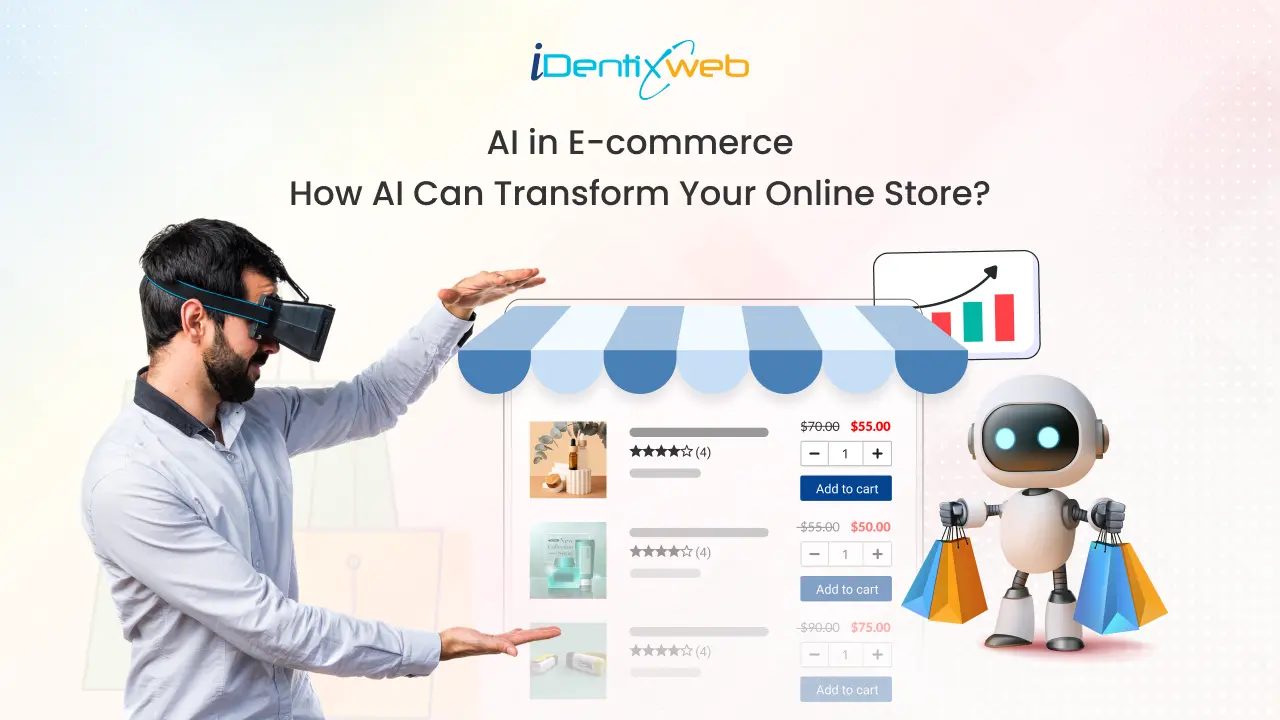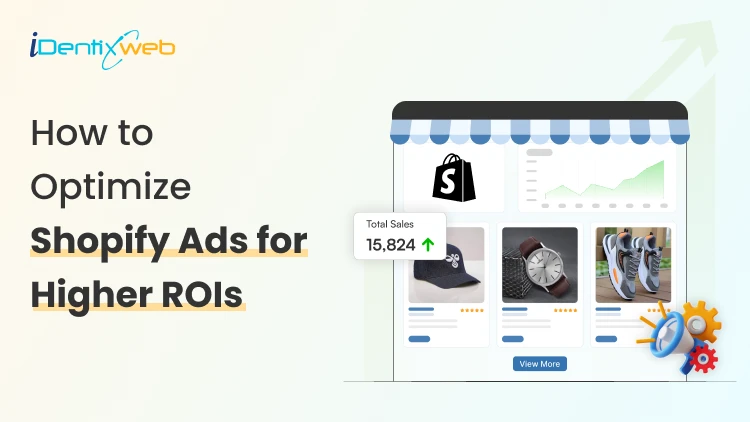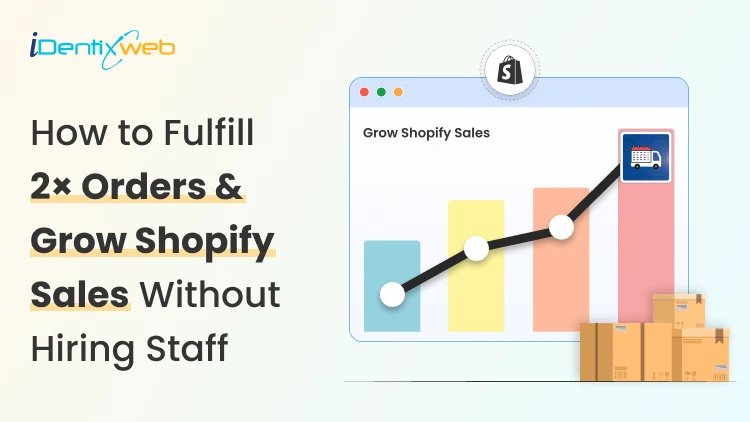
When ChatGPT was released in 2022, it really changed the way we implement AI in business. Fast forward to now, AI has seeped its way into every industry. If you are an online merchant, AI in e-commerce is revolutionizing the way retailers conduct business.
According to McKinsey’s report, the adoption of AI tools for e-commerce has increased by 25% every year since 2025 and is still picking up pace.
Artificial intelligence is not just one tool for e-commerce. It comprises multiple models. There are three popular AI technologies used in e-commerce.
3 Types of AI Technologies for E-commerce
These are the three AI technologies that e-commerce merchants are using to enhance their stores.
Machine Learning
Machine learning is the process by which your system makes decisions on its own without any need for programming.
It involves feeding your system with historical data so that it can identify patterns of past shopping behavior. This way, it can adjust its decisions accordingly.
Machine learning is used for demand forecasting in e-commerce, which we will learn shortly.
Natural Language Processing
This is the process of enabling your e-commerce system to analyze and generate human language naturally.
Chatbot is a great example of this. When deployed in customer service, it interprets human languages and provides appropriate responses.
Computer Vision
In an e-commerce business, visual media is very important for displaying products. Computer vision is an AI technology that helps computers extract information from images and videos.
For example, customers can upload an image of a dress and search for matching items in the store.
Every new technology has its benefits and challenges. Let’s take a look at some of the most common AI benefits and challenges in e-commerce.
Benefits & Challenges of Using AI in E-commerce
Let’s look at the three most important benefits of AI in e-commerce.
Benefits
Reduce Operational Costs
Manual operations like emailing, handling customer queries, creating invoices, and more can be taken care of by AI. This will reduce your operational costs significantly, and you can focus on other tasks to grow your business.
Boost Sales
With machine learning technology, you can analyze past shopping data and adjust your marketing & sales funnel. For example, by analyzing this data, you can personalize your product recommendations and boost your sales.
Enhanced Customer Service
The omnichannel e-commerce has led to multiple touchpoints for customers to interact with the company. AI technologies can interpret these customer interactions and personalize the responses. This enhances your brand’s customer experience.
Now, let’s move on to take a look at the three challenges for merchants while implementing AI in e-commerce.
Challenges
High Upfront Costs
It involves buying subscriptions to AI tools for e-commerce and hiring employees who are experienced in this field. There’s a high initial investment to adopt AI, and since this technology is now at its peak, the infrastructure and maintenance costs are high.
Data Quality & Privacy
AI in e-commerce uses customer data to analyze shopping behaviour. This means you are responsible for handling this data in your system. This increases your risk of violating any data protection laws, and if caught, the government will issue heavy fines.
Generative AI is one of the most popular models to create content for your e-commerce website. Although it is fast, the quality of this data cannot be trusted. You need regular quality control when uploading anything generated by AI.
Lack of Control
AI can automate many manual tasks for e-commerce stores, but without a control mechanism, it might backfire.
For example, AI chatbots can solve customer queries. But you need to set up a process where, if the customer is unsatisfied with the bot, he or she can connect to a human agent. Without this, customers will feel dissatisfied with your business.
Now let’s understand in which areas you can implement AI in e-commerce with use cases.
6 AI Use Cases in E-commerce
Virtual Assistants
If you are running an e-commerce business, customers will have many queries. This includes your products, shipping, pricing, discounts, refunds & returns policies, and payment methods. What you can do is integrate an AI shopping assistant into your website, which can automate customer service. Visual assistants like Tidio are great for automating conversations across multiple platforms. This will help you save time to focus on growing your business.
AI-powered Product Recommendations
Recommending relevant products during the customer’s shopping journey is one of the best upselling & cross-selling strategies. Based on customer behaviour, AI can recommend relevant products to customers on the product page, checkout, or the thank you page.
This increases your average order value as you encourage customers to buy additional products with a discount.
For example, during customer interactions, natural language processing technology can study the customer’s preferences and suggest products to them while they are shopping.
Pricing Automation
You need to adjust your prices based on the supply and demand and your competitors' pricing. With AI in e-commerce, you can optimize your pricing accordingly based on many criteria.
For example, let’s say you have a Shopify store selling shoes, and you are also a seller on Amazon. If the sales of products suddenly start to spike on Amazon, AI helps with optimzing the prices for this platform to increase your revenue.
AI in e-commerce also analyzes historical data to automate dynamic pricing on products in your store.
Generative AI in E-commerce
Generative AI, or GenAI, is the technology that generates text, video, image, audio, and other media based on prompts the users provide. GenAI tools like Jasper and Synthesia are used by e-commerce companies to produce content for their online store.
GenAI tools automate content creation for product descriptions, product listings, ad copies, landing pages, emails, and more. This helps you set up your online store instantly. To improve content quality and reduce AI detection risks, many marketers adopt an AI Humanizer.
Product Demand Forecasting
Demand forecasting is the process of predicting future customer demand for any product based on historical data. For example, online merchants use AI-integrated RFID tags to analyze which products are selling, their delivery date & time during the year to predict future demand of the product.
This is also called predictive analytics. Apart from RFID tags, the technology also uses weather forecasts and market trends to predict the demand and supply of products in e-commerce. This helps to manage your inventory in a better way.
Fraud Detection
In e-commerce, there are different types of fraud, such as transaction fraud, return fraud, and chargeback fraud. AI technologies can spot unusual transactions and analyze customer profiles based on browsing habits and behaviour data in real-time to detect inconsistencies and flag them for investigation.
For example, AI solutions for e-commerce like Chargeflow use artificial intelligence to help e-commerce store owners prevent chargeback fraud.
Is AI E-commerce Worth It? The Future of Online Shopping
The crux of AI in e-commerce is automation. Many big e-commerce platforms like Shopify are using AI assistants like Sidekick to help customers manage their online stores easily.
There are many benefits and challenges with AI in e-commerce, as we have learnt. The most important thing is to adapt to the new technologies. Sure, AI does have its problems, but it’s becoming better and better with each passing day. The future of e-commerce lies with merchants adapting and growing with new emerging technologies.
FAQs
1. How to use AI in ecommerce?
AI can be used in e-commerce in a variety of ways. This includes demand forecasting for products, customer service, & automating tasks like product descriptions.
2. What is AI in ecommerce?
AI in e-commerce comprises the technology used by e-commerce merchants to enhance their online stores. This includes using technologies like natural language processing, machine learning, and computer vision.
3. What are the best tools for AI in e-commerce?
Jasper, Lyro by Tidio, and Synthesia are top-notch tools for AI in e-commerce.
4. Does Shopify have AI?
Yes. Shopify has an AI assistant called Sidekick to automate various tasks in the platform.
5. Can AI create an e-commerce website?
Yes. All e-commerce platforms like Shopify, WordPress, and Wix have an AI website builder that helps you develop websites in no time.







About the author
Vineet Nair
Vineet is an experienced content strategist with expertise in the ecommerce domain and a keen interest in Shopify. He aims to help Shopify merchants thrive in this competitive environment with technical solutions and thoughtfully structured content.